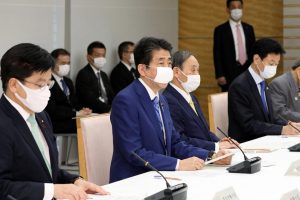Last Friday Japan’s longest serving prime minister, Abe Shinzo, stepped down for health reasons, sparking a leadership vacuum in the absence of a clear political successor. With only one year remaining in his third and final term, Abe’s unexpected exit amidst the global coronavirus pandemic shocked the public despite media speculation over his poor physical health. Abe, 65, suffers from a rare chronic colon disease, ulcerative colitis, which forced him to resign in his first term as prime minister back in 2006. Abe will remain in office until a successor is chosen.
After seven years and eight months in power, Abe made history on August 24 for holding the highest number of consecutive days in office. While Abe’s popularity has frequently dipped and rebounded after a series of embarrassing political favoritism and corruption scandals, he has consistently dodged calls for resignation through a public apology and declaration of innocence. But with the coronavirus crisis and economic fallout proving an unprecedented challenge, the Abe administration has faced mounting criticism for failing to curb the virus’ outbreak. Public opinion polls reveal a loss of confidence in Abe’s pandemic leadership and crisis management.
Last week Abe addressed the nation in a highly anticipated press conference revealing he cannot guarantee his ability to continue to serve the Japanese people. He justified the timing as mirroring a downtrend in coronavirus cases and added this was not the end to his political career, citing plans to run in the next general election in 2021. Some critics viewed Abe’s resignation an excuse to avoid taking accountability or to prevent the tarnishing of his political legacy. On the other hand, supporters within in the LDP emphasize that the unprecedented coronavirus challenge leaves no room for the chance that the prime minister could be suddenly sidelined by health concerns .
“The Abe who is resigning in 2020 is not the Abe who took office in 2012,” says Rob Fahey, a research associate at the Waseda Institute of Political Economy in Tokyo. He sees Abe’s failure to realize his long-term political ambition of revising Japan’s pacific constitution as a pragmatic transition from the staunch ideological ambitions the prime minister came in with. “He started out much more ideologically driven and is somebody who learned that compromise and stability was actually worth sacrificing some of that ideology,” Fahey explains.
Fahey says that Abe’s success in driving the controversial 2015 mutual defense pact security laws marked a watershed departure from Japan’s post-war pacifism, but since then people have started to see that he has been a good technocrat rather than a good leader. Amid the pandemic, Japan’s first serious national crisis during Abe’s tenure, public criticism over Abe’s handling of the coronavirus outbreak pointed out the lack of proactive leadership in favor of reactive measures.
In recent months Abe has kept a low profile, holding his first news press conference in 50 days on August 7. Lawmakers close to Abe denied rumors that Abe was unwell amid criticisms he has been missing in action during a “second wave” of coronavirus infections.
A LDP presidential race is planned for September 14, but the winner will only be guaranteed a one year stint before having to run in a general election in 2021. While LDP front runner former Defense Minister Ishiba Shigeru, 63, and Former Foreign Minister Kishida Fumio, 63, have officially launched their bids, Abe’s right hand man Suga Yoshihide, 71, who has served as chief cabinet secretary for eight years, also declared his candidacy this week. Suga has risen to become the clear frontrunner to succeed Abe with his popularity on course to secure 70 percent of LDP lawmaker votes.
With Japan in the midst of a live crisis, Fahey says Abe’s successor will spend the next year firefighting and tackling the economic fallout. As Japan gears up for a post-Abe landscape, the vacancy comes at a time when no one wants to be prime minister. Abe’s successor will inherit a mammoth recovery mission of not only pulling the country out of its steep economic recession, but also carefully balancing coronavirus with social economic activities in a way that allows the postponed 2020 Tokyo Olymics Games to be executed in some form next year.
Fahey says any candidate with significant leadership ambitions won’t have time to achieve their own policy agenda, which makes the ideal candidate someone like Suga who has limited political ambition. From a managerial perspective, Fahey believes Suga is the most competent candidate who would create the least amount of disruption — in contrast to anti-Abe candidate Ishiba, who would most likely shake up the administration. “Suga is going to be able to walk in and hit the ground running like an experienced pilot walking into the cockpit,” Fahey says.

































